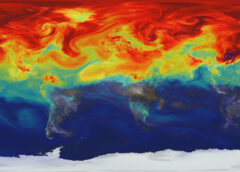Tag: climate change
-
Can Shifting Social Norms Help Mitigate Climate Change?

Newswise — Climate change is the result of many human activities, from carbon emissions to deforestation, and it will take multiple and varied interventions to mitigate it, including legislation, regulation, and market-based solutions implemented at local, national, and global levels. Demand-side factors, such as changes in social norms, can also help by creating political pressure…
-
NASA, FEMA Release Comprehensive Climate Action Guide

NASA and the Federal Emergency Management Agency (FEMA) have released a guide which provides resources for adapting to and mitigating impacts of climate change.
-
WHO and UN partners’ compendium of 500 actions aims to reduce diseases from environmental factors and save lives

Almost 25% of deaths worldwide could be prevented if the actions in the compendium were fully implemented Friday, 3 September 2021 – WHO, UNDP, UNEP and UNICEF have partnered to create a new compendium of 500 actions aimed at reducing death and diseases driven by environmental risk factors, the first such resource to unite…
-
Russian Forests Are Crucial To Global Climate Mitigation

Russia is the world’s largest forest country. Being home to more than a fifth of forests globally, the country’s forests and forestry have enormous potential to contribute to making a global impact in terms of climate mitigation. A new study by IIASA researchers, Russian experts, and other international colleagues have produced new estimates of biomass…
-
Climate change cut farming productivity growth 21% since 1960s

Newswise — ITHACA, N.Y. – Despite important agricultural advancements to feed the world in the last 60 years, a Cornell University-led study shows that global farming productivity is 21% lower than it could have been without climate change. This is the equivalent of losing about seven years of farm productivity increases since the 1960s. The future potential…
-
2017 Was Record Setting for Warmth According to NASA and NOAA

Recently, both NASA and NOAA have come out with separate reports regarding 2017’s record-setting warmth. Earth’s global surface temperatures in 2017 ranked as the second warmest since 1880, according to an analysis by NASA. Continuing the planet’s long-term warming trend, globally averaged temperatures in 2017 were 1.62 degrees Fahrenheit (0.90 degrees Celsius) warmer than the…
